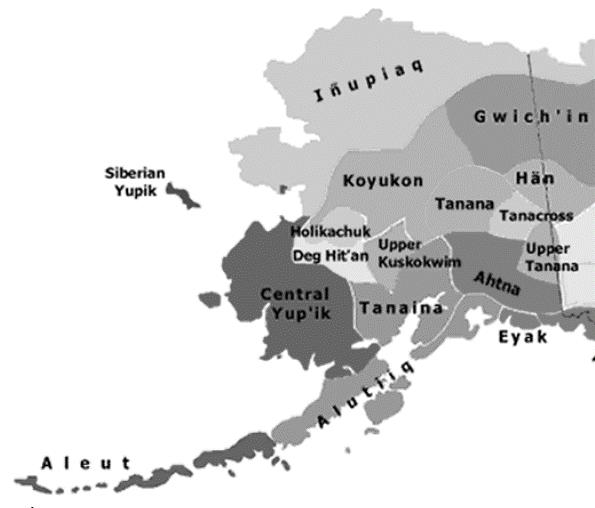Iñupiaq Studies
Overview
The Iñupiaq Studies program offers students an opportunity to pursue an Associate of Arts degree or certification focused on Iñupiaq culture and language. The program incorporates the history, values, traditions, and knowledge of Iñupiat people to enhance student learning.The program is designed to accommodate full and part-time students. Students may begin at any point and may take classes for which they meet the prerequisites.
Degree Outcomes
Upon successful completion of the Iñupiaq Studies program, graduates will:
- Have an understanding of fundamental principles of the Iñupiaq language
- Be able to read, write and speak Iñupiaq at the beginner level
- Be able to develop objects of art in the Iñupiaq style
- Demonstrate increased understanding of the relationship of Iñupiaq culture to the land, sea, and animals.

Did You Know?
Iñupiat are Alaska Native peoples; our homelands span northeast from Norton Sound on the Bering Sea to the northernmost part of the Canada–United States border. Iñupiat people reside in 34 villages across Iñupiat Nunaŋat (Iñupiaq lands): Eight villages in the North Slope Borough, affiliated with the Arctic Slope Regional Corporation; eleven villages in Northwest Arctic Borough; and sixteen villages affiliated with the Bering Straits Regional Corporation.
Degrees and Certificates
-
Iñupiaq Studies, Associate of Arts -
Iñupiaq Culture and Language I, Certificate -
Iñupiaq Culture and Language II, Certificate
Courses
IÑU 111: North Slope Iñupiaq Grammar I
Credits 3IÑU 114: Foundations of Iñupiaq Language Learning
Credits 1IÑU 118: Topics in Iñupiaq Studies
Credits 1 3Exploration of various Iñupiaq Studies topics taught either through hands-on learning or lecture-based learning. Topics pertain to cultural and traditional ways of knowing and may include a cross-disciplinary approach. (Course may be repeated for credit when content varies.)
IÑU 121: Elementary Iñupiaq I
Credits 3IÑU 131: Elementary Iñupiaq II
Credits 3IÑU 135: Iñuit Art Studio
Credits 3IÑU 158: Traditional and Contemporary Iñupiaq Food Preparation
Credits 3IÑU 199: Practicum in Iñupiaq Studies
Credits 1 3IÑU 210: Iñupiaq Land, Use, Values and Resources
Credits 3IÑU 213: Iñuit Storytelling
Credits 3Course content consists of learning traditional stories across Iñuit nunaat (lands) through different formats, including oral presentations, reading books and articles, audio recordings, videos, interviews of Elders or community members, and more. Storytelling techniques, narrative structure, and Iñuit history and traditions will be examined in this course.
IÑU 214: Iñupiaq Drum Construction and use
Credits 3IÑU 220: North Slope Iñupiaq History and Culture
Credits 3IÑU 224: Iñupiaq Knowledge and Use of Arctic Plants
Credits 3IÑU 257: Traditional and Contemporary Skin Sewing
Credits 3IÑU 260: Iñupiaq Songs, Dances, and Drumming
Credits 3IÑU 295: Northern Alaska Indigenous Leadership Seminar (Cross-listed ANS 295)
Credits 3INU 109: Qulliq (Seal Oil Lamp) Carving
Credits 1Students will learn how to hand carve and customize a qulliq (seal oil lamp) and learn to light it utilizing traditional and contemporary materials. This course also covers the history and traditional stories relating to the qulliq.
INU 112: North Slope Iñupiaq Grammar II
Credits 3Continuation of INU 111, introduction to Iñupiaq, the language of Unalakleet, Seward Peninsula, Kotzebue Sound, and the North Slope. Open to both speakers and non-speakers. For speakers, the course provides literacy and grammatical analysis. For others, it provides a framework for learning to speak, read, and write the language. Introduction to dialect differences. (Prerequisite: INU 111).
INU 113: Alaska Native Claims Settlement Act (ANCSA)
Credits 1This course provides an overview of the Alaska Native Claims Settlement Act (ANCSA) of 1971, including the history, implementation, and legacy. ANCSA corporations, land rights and management, and contemporary issues will be explored.
INU 194: Cultural Knowledge of Native Elders and Community Members
Credits 3This course will present students with aspects of traditional knowledge and values as shared by Native Elders and community members. The course will utilize oral presentations, books, articles, and audio recordings to explore past and current cultural traditions.
INU 218: Topics in Iñupiaq Studies
Credits 1 3Exploration of various topics in Iñupiaq Studies, including topical and thematic explorations of Iñupiaq history, culture, self-determination, identity, folktales, language, and values. The course may involve multi-disciplinary and cross-disciplinary approaches with a grounding in Iñupiaq ways of knowing and/or through an Indigenous lens. Research, writing, and presentations may be required. (Prerequisite: ENGL 111 or concurrent enrollment in ENGL 111).
INU 223: Tribal Governance
Credits 3This course is an introduction to the study of tribal government and politics in Alaska, including tribal legislative, judicial, and administrative responsibilities. The course will review concepts of federal Indian law and land claims, including ANCSA. Self-determination and self-governance for building and enhancing tribal governments will also be discussed.
